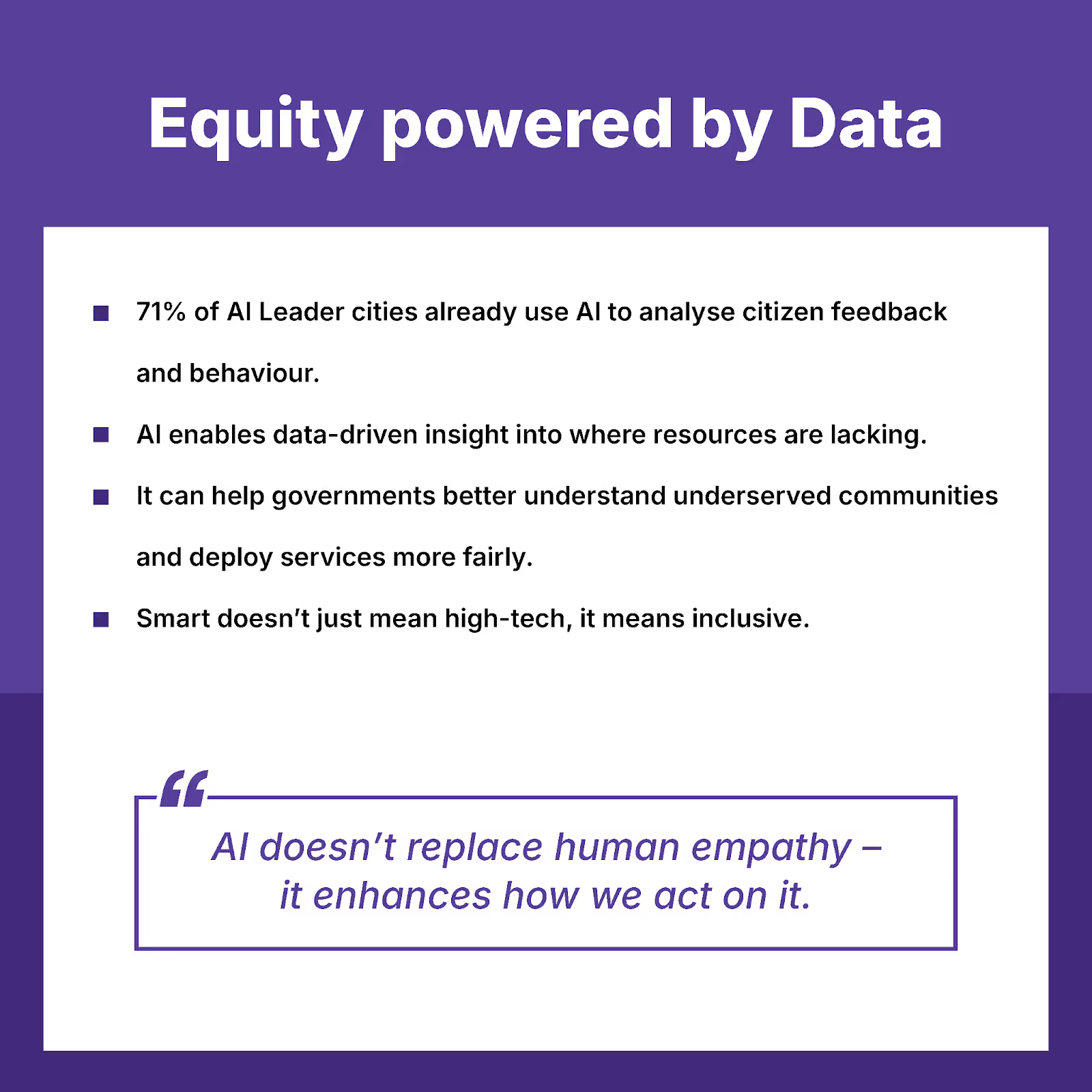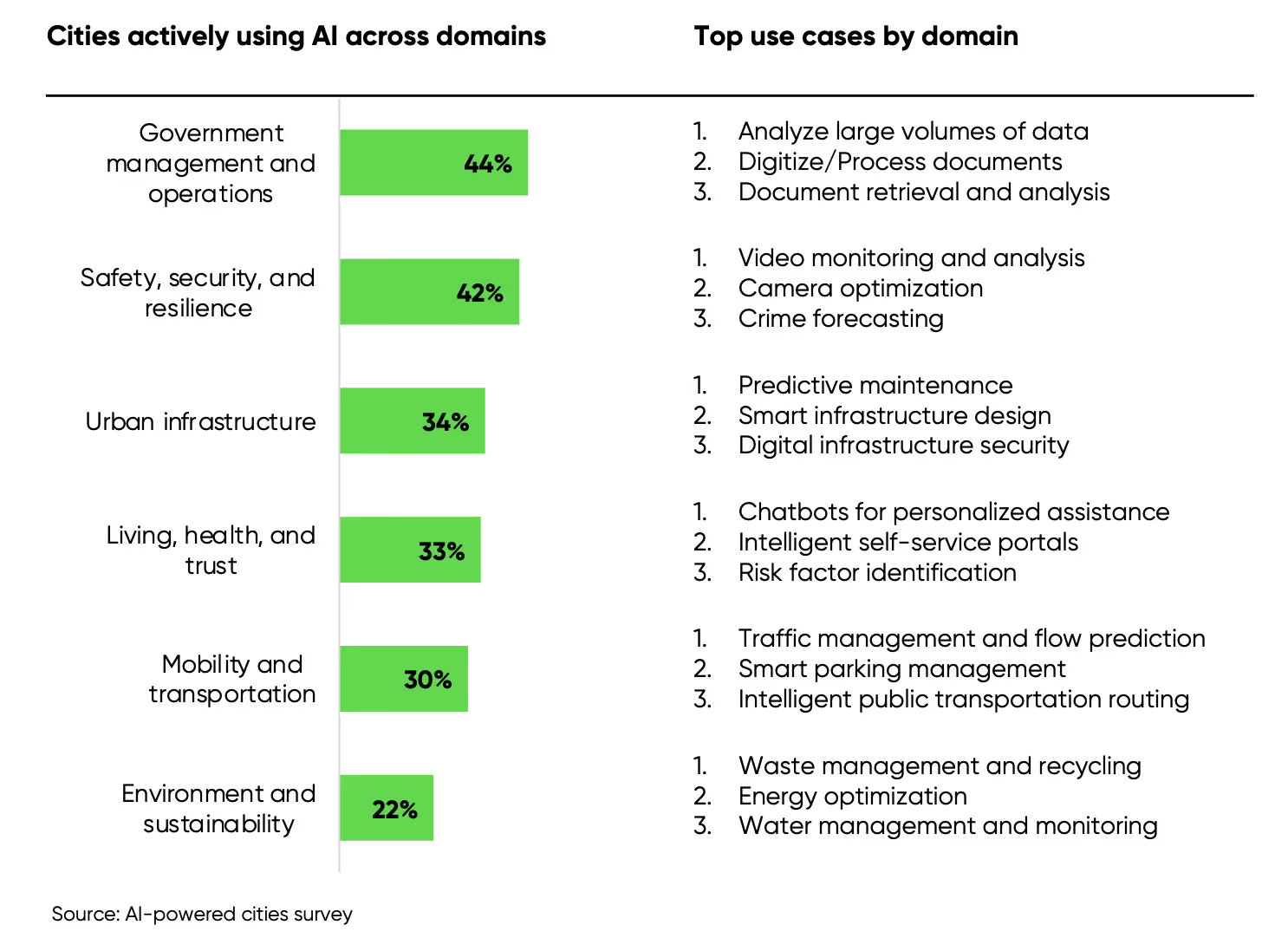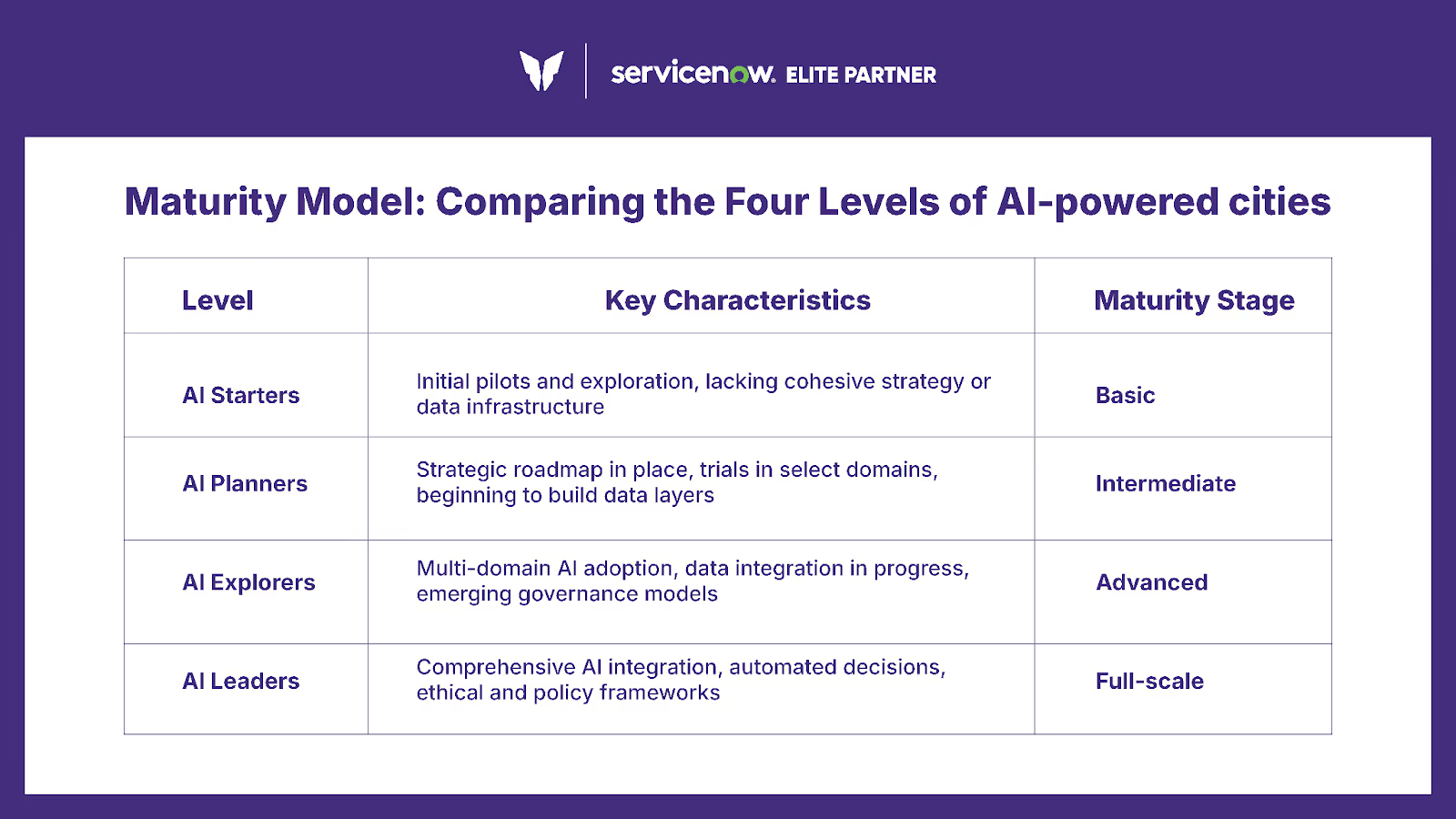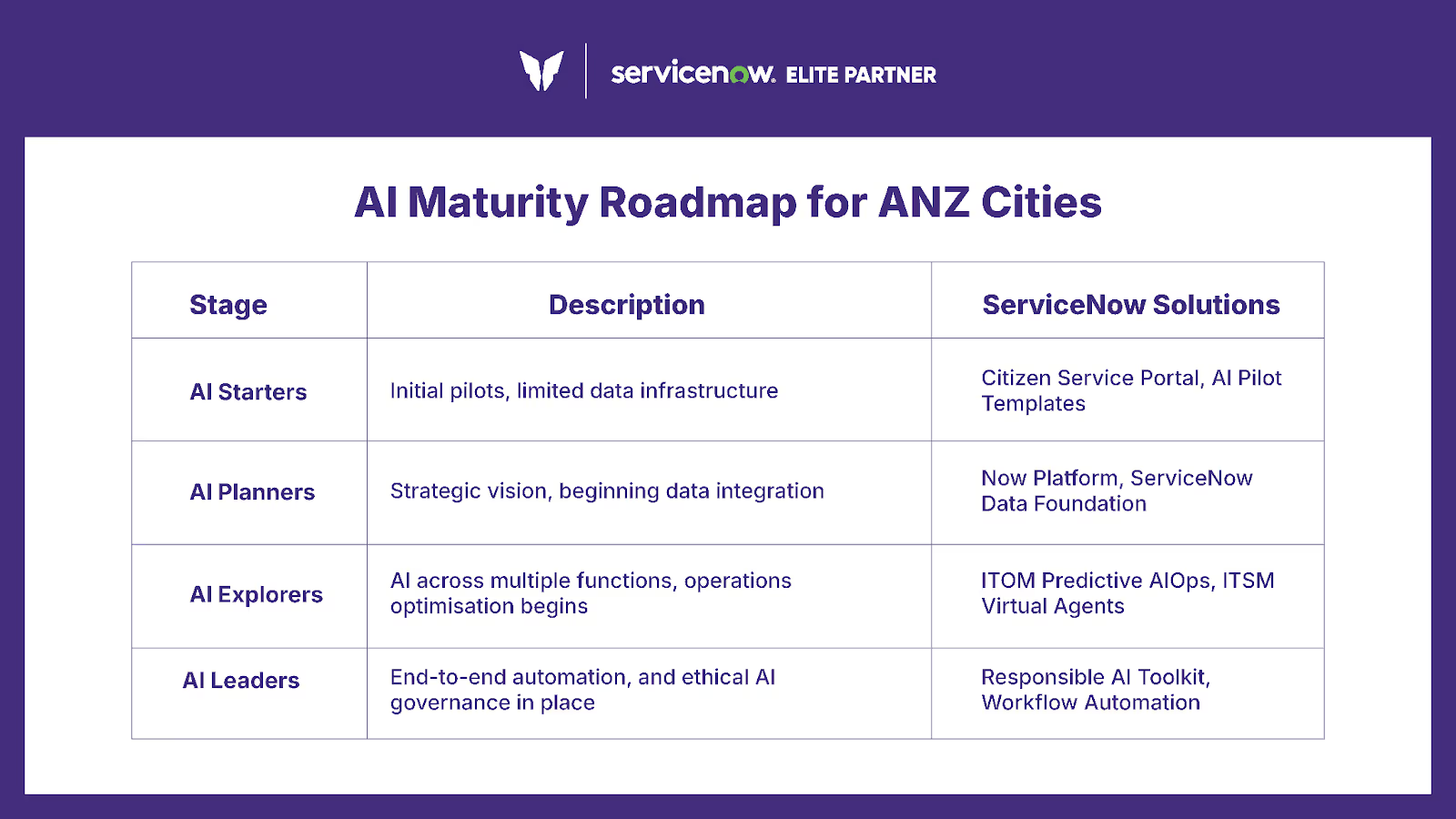AI-powered smart cities: The inevitable future of smart governance in Australia and New Zealand
As global cities face unprecedented pressure from population growth, climate change, and rising citizen expectations, AI-powered smart cities are emerging as a strategic and urgent solution.
In Australia and New Zealand (ANZ), where cities are constantly looking to enhance operational efficiency and service quality, implementing AI in urban governance is no longer a choice but is a strategic necessity to build sustainable smart cities that prioritise people.

Let’s explore how leading AI-powered smart cities across the globe are using technology to improve urban life with Novabridge.
AI-powered smart cities: An inevitable reality and future
AI-powered smart cities no longer seem to be a foreign concept to developed nations over the past two years. In a broad sense, AI-powered smart cities refer to intelligent urban areas that leverage artificial intelligence (AI) to enhance the efficiency of urban management and operations, while improving residents’ quality of life.
AI automates processes such as permit approvals, service requests, and behavioural analysis, reducing workforce strain and laying the groundwork for more advanced applications like AI in ITSM and ITOM, which ensure digital services remain robust and responsive.
Deploying AI in urban environments is no longer a future concept, it’s happening now, at scale. More specifically, according to the 2024 report “AI-powered smart cities of the Future” by ServiceNow, Deloitte, and NVIDIA, cities surveyed in APAC will lead the way, with nearly 6 out of 10 expecting to be widely using AI in three years.
Why? There are three clear indicators of this irreversible shift:
- 89% of major cities worldwide are either implementing or planning to adopt AI, showing high-level strategic commitment from governments and city authorities.
- 83% of cities have incorporated AI into their long-term strategies, well beyond the pilot stages. Cities like Singapore, Amsterdam, and Dubai have established city-wide AI policies with dedicated budgets and clear regulatory frameworks.
- 79% of city leaders believe AI is essential to tackle urban challenges like climate, population growth, and public service demands over the next 5-10 years.

A city official from Barcelona summarised it best: "We can’t manage the city of the future by working like we did in the past. AI will be the foundation for better and fairer decision-making."
AI is no longer just a tool, it’s a foundational layer of the new urban architecture where data-driven decisions, automated processes, and citizen-centric services become the norm. To get the right way to use AI responsibly, leaders also need to understand the AI spectrum in digital transformation.
AI-powered smart cities as a strategic solution for Australia and New Zealand
Why AI is critical for ANZ cities
Not every city may feel an immediate need for AI, according to some government leaders. However, in densely populated urban centres facing complex, large-scale challenges, AI emerges as an effective and often irreplaceable solution.
- Growing public service demands: Cities like Melbourne, Sydney, and Wellington must scale services without equivalent budget growth. AI automates processes such as permit approvals, service requests, and behavioural analysis—reducing workforce strain.
- Environmental and infrastructure management: Wellington uses AI to predict floods and manage wastewater resources. Melbourne applies AI-integrated sensors to detect environmental anomalies. The report shows that 48% of cities use AI in energy and environmental operations.
- Bridging urban-rural gaps: AI-powered chatbots enable 24/7 access to services for remote citizens and gather decentralised feedback to inform localised policy. 65% of cities surveyed use AI in citizen-facing platforms.
AI – A game changer for Citizen Experience
Today, AI is not only powering smarter city operations but also transforming citizen engagement and satisfaction. According to the report, 71% of cities categorised as AI Explorers or Leaders are actively using AI to analyse citizen behaviours, feedback, and needs, enabling them to personalise and optimise public policies.
These innovations not only improve satisfaction but also rely on a resilient infrastructure, where AI in ITSM and ITOM ensures seamless backend operations that support dynamic front-end experiences.
- AI is integrated into feedback channels like chatbots, digital service portals, and social media, enabling real-time insights.
- Cities such as Dubai, Barcelona, and Helsinki have used AI to dynamically adjust public transport schedules, automate citizen response workflows, and even forecast seasonal service demands.
- The result? Improved public trust, reduced wait times, and significant cost savings in service delivery.

In ANZ, cities are facing increasing pressure from rapid urbanisation—leading to service delivery disparities, environmental stress, and constrained public budgets.
Against this backdrop, AI has become a strategic solution, clearly outlined in national policies such as Australia’s Artificial Intelligence Action Plan (2021), which includes AU$124 million in funding, and New Zealand’s Algorithm Charter for Aotearoa New Zealand, promoting transparent, fair, and responsible use of AI.
These frameworks reaffirm a long-term vision for ANZ: AI isn’t just an innovation tool, but a strategic foundation for people-centred urban futures.
Leading smart cities in AI adoption across ANZ
This is no longer theoretical, AI is already being deployed across Australia and New Zealand, with impactful results since 2021. Here are three cities recognised as AI Explorers:
- Melbourne: Not only the leading smart city in ANZ, Melbourne is known as one of the top AI APAC leaders. Uses AI to analyse citizen feedback, optimise real-time traffic, and monitor CO₂ emissions via cloud-connected sensors, the Melbourne government focuses on sustainability - one of the city’s most important AI initiatives.
- Sydney: Launched the “Connected City” initiative, piloting AI to streamline urban issue reporting and analyse citizen needs via social data, Sydney is the next famous smart city in Australia. It also promotes environmental sustainability through initiatives like renewable energy and smart waste management, ensures digital inclusion, and plans resiliently for climate risks.
- Wellington: The integration of AI in Wellington is visible in various sectors. For instance, Wellington City Council has implemented AI to manage waste collection more efficiently, using predictive algorithms to optimize routes and schedules, reducing both costs and environmental impact. In the realm of public safety, AI surveillance systems are being trialled to enhance security in public spaces, with facial recognition technology sparking both interest and debate over privacy concerns.
While no ANZ city has yet reached the "AI Leader" tier, these initiatives form a strong foundation for comprehensive urban AI transformation.

Key risks & solutions from ServiceNow Responsible AI
While AI-powered smart cities bring enormous benefits in terms of operational efficiency and citizen experience, they also introduce critical risks if not governed appropriately. According to the S&P Global report, the key risks include:
1. Data Privacy & Surveillance Concerns
The collection of data from sensors, cameras, and digital platforms can lead to breaches of privacy if not managed with strong safeguards. Citizens may grow concerned over excessive surveillance or the use of personal data without informed consent.
ServiceNow's solution:
- Built-in access controls:
The Now Platform provides integrated access governance, ensuring only authorised personnel can interact with sensitive data. - Personal data protection:
ServiceNow adheres to strict policies ensuring that customer data is not used to train AI without explicit permission. All AI requests are processed in-region and are not retained once the task is completed.
2. Algorithmic Bias & Lack of Transparency
AI can unintentionally reinforce biases present in historical data, leading to unfair outcomes in areas such as service allocation, urban planning, or law enforcement. A lack of transparency around how algorithms make decisions undermines public trust.
ServiceNow's solution:
- Responsible AI principles:
ServiceNow is guided by Responsible AI principles — designing AI systems that are human-centred, equitable, and transparent. - Governance toolkits:
A comprehensive set of tools enables customers to implement their own AI governance programmes across the entire lifecycle of AI — including third-party and internally developed models.
3. Cybersecurity Threats to Critical Infrastructure
As cities become increasingly reliant on AI to manage vital infrastructure (transport, energy, health), they also become more vulnerable to cyberattacks. Such disruptions could compromise public safety and essential services.
ServiceNow's solution:
- End-to-end security controls:
ServiceNow applies robust physical, administrative, and technical safeguards, including processing AI tasks exclusively in secure regional data centres. - Flexible AI model options:
Customers may choose between ServiceNow’s own AI models or trusted OEM services such as Azure OpenAI, with secure APIs and full data residency control.
By integrating ServiceNow’s Responsible AI solutions, cities across Australia and New Zealand can mitigate these risks and advance towards intelligent, sustainable, and citizen-centric futures with confidence.
The optimal roadmap for AI-powered smart cities with ServiceNow
8 AI action steps to a smart city
The report highlights that not all AI rollouts succeed unless cities overcome key challenges:
- 69% of cities struggle with fragmented data and lack of integration.
- 64% lack skilled professionals to implement and operate AI systems.
- 56% cite concerns about ethics, algorithmic bias, and absent governance frameworks.
To overcome these challenges, successful AI cities applied a formula roadmap:
Step 1. Make a Top-Down Commitment
AI transformation starts with vision and leadership. APAC AI leaders drive change from the national level, cascading down to cities with clear plans and dedicated budgets. This strategic approach allows for large-scale impact and cohesive execution across urban areas.
Step 2. Build a Modern IT Foundation
A robust, cloud-based digital infrastructure is critical. Leaders are advancing efforts to gather and integrate urban and external data sources, streamlining operations through automation.
Step 3. Develop AI Skills, Talent, and Processes
Bridging the digital skills gap is essential for AI success. Cities are investing in workforce capabilities and creating specialist teams to oversee AI implementation.
Step 4. Cultivate an Innovation Ecosystem
Collaboration is key. APAC cities are partnering widely with startups, businesses, and academia to tap into talent, share resources, and co-develop urban AI strategies.
Step 5. Transform Domains with AI and GenAI
AI isn’t confined to a single sector. Forward-looking cities are scaling both traditional AI and Generative AI across core urban domains to boost efficiency and quality of life.
Step 6. Unlock Value by Combining AI with Other Technologies
Synergy with complementary technologies—like cloud, automation, and cybersecurity—unlocks the full potential of AI and enables breakthroughs previously thought impossible.
Step 7. Keep Data Security Top of Mind
With the surge in connected devices and data use, APAC cities are bolstering their defences. Leaders prioritise cybersecurity to protect systems from breaches and maintain public trust.
Step 8. Enable Responsible Use of AI
Ethical AI is non-negotiable. Leaders are aware of risks like bias, misinformation, and job displacement. To ensure responsible implementation, they build strong governance frameworks.
A note on IT Infrastructure use cases
- While AI is often highlighted in public-facing domains like transport or environmental services, it also plays a critical foundational role in IT operations.
- AI in ITSM and ITOM is increasingly vital: from automated incident resolution and infrastructure anomaly detection to ensuring uninterrupted digital government services, self-healing systems, and scalable cloud-based service management.
- With its open architecture and ready-to-deploy AI modules, ServiceNow enables governments to integrate these capabilities into their current systems, laying the groundwork for future service expansion powered by AI in ITSM and ITOM.
Novabridge – Elite Partner for Responsible AI in ANZ Governments
As an Elite Partner of ServiceNow in consulting and implementation in ANZ, Novabridge is recognised for its strategic consulting, implementation excellence, and commitment to public sector transformation. Novabridge is the top choice for governments looking to adopt responsible, scalable, and citizen-centric AI.
This isn’t just talk, it’s proven by successful projects:
- National Health and Medical Research Council: Enhancing customer support with ServiceNow research help centre service portal
- Department of Health and Aged Care: Driving digital transformation across IT, HR, and onboarding Procurement workflows
- Defence Digital Group: Modernising projects and risk management with ServiceNow SPM & IRM
With deep technical and domain expertise in AI in ITSM and ITOM, Novabridge helps local governments turn the smart cities' vision into an impactful reality. Their consulting portfolio includes custom strategies for AI in ITSM and ITOMrollout across multiple public sector agencies, aligning operations with digital transformation priorities.
Conclusion
Cities across Australia and New Zealand stand at a critical inflection point. Those who act early with a clear AI strategy, integrated data infrastructure, and trusted implementation partners will become leaders in the smart city era.
Start building your AI-powered city today for a future that is sustainable, efficient, and human-centred.
Novabridge, your trusted ServiceNow partner, especially in AI in ITSM and ITOM, is ready to guide your AI journey across both citizen services and internal IT ecosystems.
👉 Contact Novabridge to explore strategy consultation, solution demos, or tailored ServiceNow AI deployment plans for your city.


